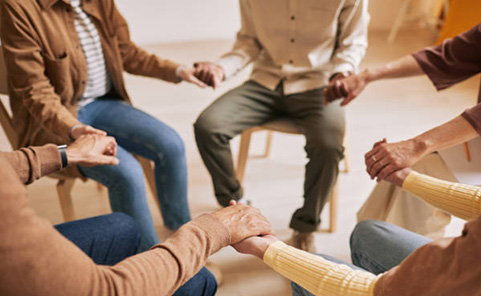Alcohol and drug addictions introduce difficulties when you or someone you care about experiences them. However addiction is a treatable disease and by using proven and professional treatment methods, long-term recovery can be achieved.
Our Guide will detail how integrating addiction treatment methods can encourage a sober future for you or a loved one.
What is Addiction Rehab (Rehabilitation)?
The term substance ‘rehabilitation’ is applied to all of the medical and psychological treatments used to help individuals who are struggling with dependencies on illegal or prescribed medications.
Addiction Rehab that is specific to your individual needs is successful when it includes medically-managed detox, inpatient programs, outpatient services and extended support.

Facts & Statistics about Addiction in Anaheim
Prevalence of Substance Use Disorder, by Drug Type
(IN THOUSANDS)
- 2,7578.5%Any Substance
- 2,0886.4%Alcohol
- 1,0683.3%Ilicit Drugs
- 2060.6%Pain Medication
Drug- and Alcohol-Induced Deaths by Age Group, California, 2016
- Alcohol-Induced
- Drug-Induced
- 18 to 250.5
- 9.6
- 26 to 354.3
- 13.9
- 36 to 6424.2
- 22.9
- 65+23.7
- 9.4
Drug Use, by Selected Type and Age Group California, 2015 to 2016
- 12 to 17
- 18 to 25
- 26+
- Marijuana*13.2%
- 34.0%
- 13.5%
- Misuse of Pain Medications3.5%
- 8.0%
- 4.3%
- Cocaine0.8%
- 7.2%
- 1.8%
- Heroin0%
- 0.4%
- 0.2%
What are the treatment options available in Anaheim?
By integrating treatment options, addiction specialists can work with you to identify and treat the main causes of your drug dependencies. It is necessary to treat the symptoms of addiction, but coping strategies need to be considered, in order for you to work with the problems that lead to the drug or alcohol dependency.

Private Residential Programs in Anaheim, CA
If you live within the center where you are receiving your treatments, you are taking part in a residential program. It is undoubtedly beneficial to have access to round-the-clock care and treatment options. When you reside at a treatment center you will be free from most of the stressors in your home environment that may worsen your substance dependency.
Completing your treatment program and avoiding relapse is considerably easier when you reside in a secure and controlled environment. Patients who need treatment for dual diagnosis, co-occurring disorders and severe dependencies are encouraged to consider an inpatient rehab program. We know that the first year of recovery can be crucial and after a residential treatment program, you must stay focused so that you can maintain long term sobriety. When the residential program is finished you will have the skills to be independent and your focus will be on what you would like from your new life.
Do You Need Help?
Our admissions team is ready to answer your questions.

Sober Living Programs
A sober living program will empower you with the skills you need, using compassion and understanding. You can expect:
- Guidance throughout the day from a house manager
- Establishing boundaries for positive recovery behavior
- Nurturing supportive friendships with others in recovery who will be working through the same types of challenges
Outpatient Programs
Outpatient programs are easier to adjust to so that you can maintain your family/work commitments and still undergo treatments, by coming to the rehab center at your own pace.
Outpatient programs assist you with:
- Education around substance misuse
- Counseling and therapy by means of group support or individual sessions – The duration of outpatient treatment is 3/4 months and continue for longer than a year, this depends on your own requirements.
Detox Only Programs
Most individuals need a medical detox to commence drug or alcohol rehab, as it tackles physical dependencies on substances by cleansing it from your body. As your body gets used to functioning without the substance in your body, you may experience the symptoms of withdrawal.
This marks the beginning of your rehabilitation journey, and the next steps work to confront and manage the underlining problems that lead to your addiction, so that those same issues do not happen again. You may develop withdrawal symptoms and cravings for a while after your detox phase has ended. In rehab you will learn the coping skills for long-term recovery, so that you can reduce the risk of relapse in the future.
Paying for Private Treatment
Private treatment will have to be self-funded or claimed through your insurance policy. Most health insurance providers typically cover at least parts of your rehab program, such as detox, rehabilitation, medicines that are prescribed and aftercare support.
The total amount you will be able to claim is based on your policy rules and your provider. We strongly suggest that you confirm the amount covered for treatment prior to enrolling at the treatment centre. By visiting our Verify Your Insurance page, you can find out what cover you can claim for.
Clients are liable for the cost of rehab if they do not claim from their insurance policy. In some cases, it may be possible to opt for a payment plan if the total cost is too much upfront.
State Funded Programs
State-funded rehab programs were created to assist people who do not have the financial means to recover from alcohol addiction or drug addiction.
With the help of Medicaid and state budget funding, these programs may support your recovery by including:
- Programs for a safe detox (medically-supervised if required.
- Addiction counseling, therapy and aftercare support services

State-funded rehab programs are available to individuals who are unable to get private health insurance or who live in low income areas. During the application process you will be asked for:
- Supporting Evidence that you are a US resident
- Proof of income
- Proof of where you live
- Medical details about your substance misuse
You can discover more about the application process by visiting https://www.grants.gov/
You can also download this file to contact your state agency.
The following state-funded addiction rehab programs are available in Anaheim:
Hope House Corporation
710 and 714 North Anaheim Boulevard, Anaheim, CA 92805
714-776-7490 x405
http://hopehouseoc.com/Lighthouse Treatment Center
1310 West Pearl Street, Anaheim, CA 92801
888-972-6212
https://lighthousetreatment.com/Lighthouse Treatment Center
1243 1/2 West Pearl Street, Anaheim, CA 92801
888-972-6212
https://lighthousetreatment.com/
Maintaining Addiction Recovery in Anaheim
Remaining active in your recovery can feel overwhelming when returning to home life after leaving the treatment center. You had the benefits of professional support in a controlled environment at the rehab center.
When you leave, you may encounter new challenges or triggers that test your coping skills in ways you may not have anticipated. If you had a severe dependency or if you leave rehab without the appropriate social support, you will find long term recovery to be more challenging. Guidance and aftercare support is integral in the early stages of recovery to help prevent relapse.
The following AA/NA meetings are available in Lakewood:
Back to Basics
Open, Basic Text, It Works – How and Why and Literature Study:
2370 East Orangethorpe Avenue, Anaheim, 92806
Sunday: 8:00 am – 9:30
https://orangecountyna.org/AA - Sos Sisters Offering Solution Participation Meeting
Open and Women: 318 West Ball Road, Anaheim, CA, 92801
Thursday: 8:00 pm – 9:00 pm
https://alcoholicsanonymous.com/AA - Viviendo Sobrio Anaheim
Open and Spanish: 1671 West Katella Avenue, Anaheim, CA, 92801
Sunday: 8:00 pm – 9:00 pm
https://alcoholicsanonymous.com/
Aftercare & Alumni Programs
An aftercare program is a resource to support your recovery when you go back to your daily life. Unfortunately Relapse may occur in up to 60% of individuals, and because of the unpredictability of life post-treatment, having aftercare is an important part of your journey in recovery.
When your rehab program is close to finishing, we will discuss the therapies and counseling that is supportive of your long-term recovery and the appropriate aftercare plan will be designed to assist you. Clients who complete their treatment programs will gain access to an alumni community program such as ours, which gives you the chance to interact with staff and others in early recovery. This fantastic network allows you access to our special events, which also provides ongoing support and mentorship from other ex-clients in recovery. This gives you an opportunity to reciprocate and support other former clients.
Support Groups (Fellowship Meetings)

Support groups remain an important part of long-term recovery because social structures enable long-lasting sobriety. By taking part in support groups like Narcotics Anonymous or Alcoholics Anonymous, you will follow the 12 steps and attend regular meetings for recovery support. During meetings, other members open up and share their stories and learn important insights from others. Companionship, empowerment and accountability for our actions are key to long-term recovery, and meetings provide many with the necessary tools to stay sober.
Support for Families & Children Affected by Addiction
Addiction impacts everyone in a family unit to different extents. Help and support is just as crucial for all family members as it is for the individual with the addiction issues. Joining family support groups has two important benefits: you can support yourself and the person with the addiction. Receive help and support for the Family with the below support groups:
- Parents of Addicted Loved Ones
- SMART Recovery Family & Friends
- NAMI Family Support Groups
- Al-Anon
- Families Anonymous
- Alateen
- Nar-Anon










